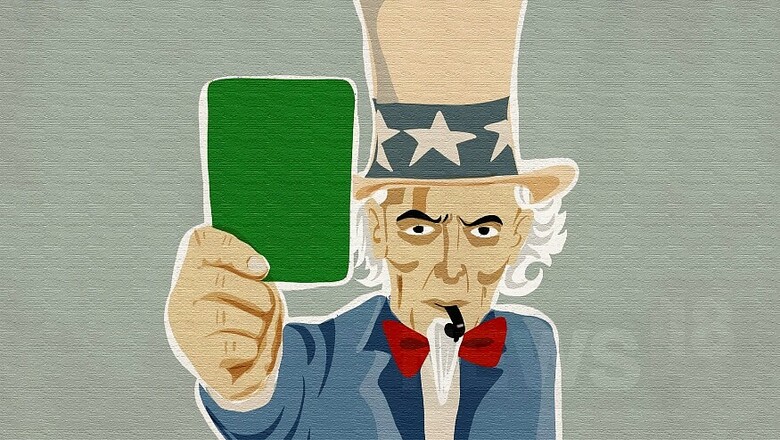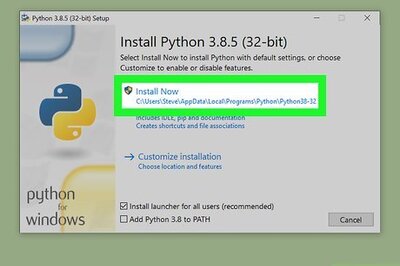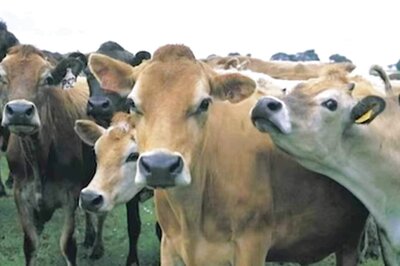
views
Washington: The United States on Monday will begin enforcing a regulation that could deny green cards or legal permanent residency to legal immigrants who seek public benefits like food stamps.
The move might affect a number of Indians who are on H-1B visas and are in long queues to get permanent legal residency.
The decision follows the Supreme Court's ruling on Friday which lifted the final remaining injunction on the 'public charge' regulation.
"As a result, the Department of Homeland Security will be able to implement its regulation on Monday," said White House Press Secretary Stephanie Grisham.
"This final rule will protect hardworking American taxpayers, safeguard welfare programs for truly needy Americans, reduce the Federal deficit, and re-establish the fundamental legal principle that newcomers to our society should be financially self-reliant and not dependent on the largesse of United States taxpayers," Grisham said.
The final rule published on August 14, 2019 was originally scheduled to come into effect on October 15, 2019, but could not be implemented due to various court rulings.
The ruling prescribes how the Department of Homeland Security will determine whether an alien is inadmissible, and ineligible to adjust status to that of a lawful permanent resident in the United States because the alien is likely at any time in the future to become a public charge.
According to US Citizenship and Immigration Services, the new rule includes a requirement that individuals seeking an extension, stay or change of status demonstrate that they have not received public benefits over the allowed amount since obtaining the non-immigrant status that they are seeking to extend or change.
According to a 2018 Migration Policy Institute Report, 61 per cent of non-citizen Bangladeshi families, 48 per cent of non-citizen Pakistani and 11 per cent of non-citizen Indian families receive public benefits that would be scrutinised under the rule.
As per SAALT (Strengthening South Asian Communities in America) organisation, the impact of the rule would be felt across the South Asian American community, as over 10 per cent of green card recipients in financial year 2016 were from South Asian countries.
Nearly 472,000 or 1 per cent of the approximately 5 million South Asians in the United States live in poverty, according to a Pew Research Center study.
In 2015, eight of 19 Asian American groups had poverty rates higher than the US average.
Among those, Pakistani Americans (15.8 per cent), Nepali Americans (23.9 per cent), Bangladeshi Americans (24.2 per cent), and Bhutanese Americans (33.3 per cent) had the highest poverty rates among South Asian American groups, the SAALT said.
The White House had said last year that this action will help ensure that if aliens want to enter or remain in the United States they must support themselves, and not rely on public benefits.
An alien who receives public benefits above a certain threshold is known as a "public charge."
Foreign nationals will be barred from entering the United States if they are found likely to become public charges.
Those migrants in the United States who are found likely to become public charges will also be barred from adjusting their immigration status, the White House.
"President Trump is enforcing this longstanding law to prevent aliens from depending on public benefit programs," the White House said, adding that the Immigration and Nationality Act makes clear that those seeking to come to the United States cannot be a public charge.
For many years, this clear legal requirement went largely unenforced, imposing vast burdens on American taxpayers.
The new rule would "have the long-term benefit of protecting taxpayers by ensuring people who are immigrating to this country don't become public burdens, that they can stand on their own two feet, as immigrants in years past have done," Ken Cuccinelli, Acting Director of US Citizenship and Immigration Services, had then told Fox News.
In a fact sheet last year, the White House said the Congress passed and President Bill Clinton signed two bipartisan bills in 1996 to help stop aliens from exploiting public benefits.
This included the Personal Responsibility and Work Opportunity Reconciliation Act and the Illegal Immigration Reform and Immigrant Responsibility Act.
As Congress made clear at the time, it is our national policy that aliens should "not depend on public resources to meet their needs."
Americans widely agree that individuals coming to our country should be self-sufficient, with 73 per cent in favour of requiring immigrants to be able to support themselves financially, it said.
"We must ensure that non-citizens do not abuse our public benefit programs and jeopardise the social safety net needed by vulnerable Americans," the White House said.
Large numbers of non-citizens and their families have taken advantage of its generous public benefits, limited resources that could otherwise go to vulnerable Americans, it said.
As many as 78 per cent of households headed by a non-citizen with no more than a high school education use at least one welfare program.
Fifty eight per cent of all households headed by a non-citizen use at least one welfare program.
Half of all non-citizen-headed households include at least one person who uses the Medicaid health programme, the White House said.


















Comments
0 comment